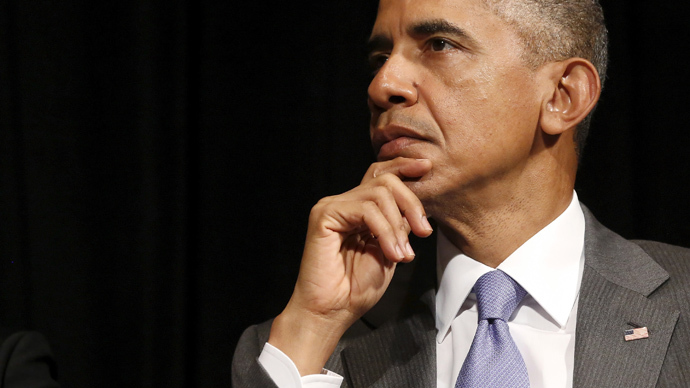Squeaking through: Senate clears way to approve Obama’s ‘fast-track’ powers

President Barack Obama managed to drum up enough support among his fellow Democrats to clear a procedural hurdle for a vote on special trade powers, as the Senate voted 60-37 to end the debate on Trade Promotion Authority (TPA).
The White House wanted the TPA in order to negotiate a series of trade pacts, most notably the Trans-Pacific Partnership (TPP) with 11 Pacific Rim countries, excluding China.
“This is a very important day for our country,” said Senate Majority Leader Mitch McConnell (R-Kentucky) adding that the TPP would send the message to the world that “America is back in the trade business,” and reassure Asian countries concerned about China that the US would remain involved in the Pacific.
Calling the TPP “another corporate-sponsored trade agreement,” Sen. Sherrod Brown (D-Ohio) said that the trade deal’s passage would force many US workers out of jobs.
BREAKING: Senate advances #TPP fast track. Sen. @SherrodBrown calls it "a day of celebration in the corporate suites in this country."
— Alice Ollstein (@AliceOllstein) June 23, 2015
“It’s a great day for big-money interests, not a great day for working families,” said Sen. Bernie Sanders (I-Vermont), adding that the TPP was opposed by “every union in this country, by almost every environmental group, and many religious groups.”
To secure the measure’s passage, Obama needed 60 votes. Last month, the Senate voted 62-37 to approve the powers. However, the proposal later foundered in the House of Representatives, when the Democrats sank a companion measure called Trade Adjustment Assistance (TAA). After some procedural maneuvering, the House ended up passing a stand-alone TPA bill, sending it back to the Senate for approval.
The president’s biggest headache has been Democratic lawmakers opposed to the proposed free trade pacts, most notably House Minority Leader Nancy Pelosi (D-California) and Senator Elizabeth Warren (D-Massachusetts). Hillary Clinton, the party’s front-runner for the presidential nomination in 2016, also came out against the TPP and other free trade deals recently.
Republican support for the pacts, which Obama has counted on, wavered as well. Senator Ted Cruz (R-Texas), one of the contenders for the Republican presidential nomination, publicly announced he would oppose the TPA.
READ MORE: Obama’s fast-track authority stuck in House slow lane
In an op-ed at the conservative website Breitbart News, Cruz cited WikiLeaks revelations about one of the pacts – the Trade in Services Agreement (TiSA) – and its provisions concerning immigration. He also blasted the Export-Import Bank as a “classic example of corporate welfare… cronyism at its worst” and pledged to vote against TPA unless it was allowed to expire.
The Ex-Im Bank, however, is a key issue for some of the Democrats Obama needs to win over, such as Sens. Maria Cantwell (D -Washington) and Heidi Heitkamp (D-North Dakota).
Getting Congress to grant him fast-track powers has been a roller-coaster ride for Obama. After losing the first procedural vote on May 12, the measure ended up passing the Senate on May 23. The House approved fast-track powers on June 12, but struck down the companion measure without which the proposal could not move forward – only to approve a standalone fast-track bill on June 18.
Many groups are opposed to the proposed free-trade pacts the White House has been negotiating in secrecy. Environmentalists object to the leaked language limiting US ability to legislate against climate change. Labor unions are concerned the pacts would result in more American jobs lost to overseas competition, as has happened with previous free-trade deals. While the conservatives favor the free trade aspects of the pacts, they have raised concerns over immigration and certain provisions that could supersede US sovereignty.













